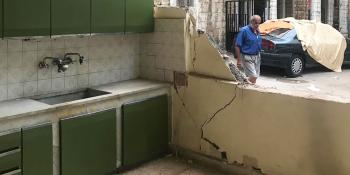
Here is my subtitle.
BEIRUT (Aug. 12,2020) — Habitat for Humanity continues to assess the incredibly extensive housing needs in the wake of an explosion that killed more than 200 people and injured 6,000 others in Lebanon last week.
Officials in the capital estimate that roughly 300,000 people have been displaced by the explosion, which destroyed entire sections of the city near the port of Beirut.
Habitat, which has developed housing solutions for nearly two decades in Lebanon, is working with partners to assess damage and identify the most impactful support for families who suffered damage or destruction of their homes. In several neighborhoods structures have been reduced to rubble and homes rendered completely uninhabitable. In others, buildings have serious structural damages. Officials say that the blast could have caused as much as US$10 billion in property damage.
While many families have been displaced, seeking shelter in houses in the mountains, more vulnerable people are sleeping in parking lots or erecting temporary shelter close to home. Many households are putting plastic sheets where doors and windows used to be and moving back into their homes.
Elie, who has a clerical job in the department of social security and lives in a residential section of Carantina, right next to the port. “You run away from all the troubles in the world to the safety of your home,” he said. “It’s supposed to be a place where you can be safe from what is happening around. Where do you go after you have been blown out of your own home in your own country?”
To support the work of colleagues in Lebanon in responding to this crisis, Habitat is launching an emergency appeal, raising vital funds to advance Beirut’s recovery.
“We in Lebanon are essentially facing a compounded disaster,” said Lubna Alattiah, Habitat for Humanity International representative in Lebanon. “We entered the year in deep and complex economic and financial crisis. Then the pandemic hit. And now the explosion has caused unimaginable damage. Home is supposed to be a refuge in times of crisis but far too many families have no place to call home now. Communities are shell shocked.”
Since 2001, Habitat’s work in Lebanon has supported housing microfinance and shelter for orphans and other vulnerable groups. In response to the Syrian refugee crisis, Habitat also has completed home repairs and renovated unfinished buildings for both refugee families and host communities in Lebanon.
About Habitat for Humanity
Driven by the vision that everyone needs a decent place to live, Habitat for Humanity began in 1976 as a grassroots effort on a community farm in southern Georgia. The Christian housing organization has since grown to become a leading global nonprofit working in local communities across all 50 states in the U.S. and in more than 70 countries. Families and individuals in need of a hand up partner with Habitat for Humanity to build or improve a place they can call home. Habitat homeowners help build their own homes alongside volunteers and pay an affordable mortgage. Through financial support, volunteering or adding a voice to support affordable housing, everyone can help families achieve the strength, stability and self-reliance they need to build better lives for themselves. Through shelter, we empower. To learn more, visit habitat.org or follow us on Twitter @HabitatEMEA.